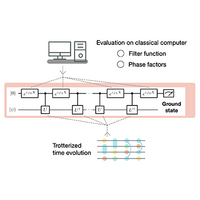Abstract
Under suitable assumptions, some recently developed quantum algorithms can estimate the ground-state energy and prepare the ground state of a quantum Hamiltonian with near-optimal query complexities. However, this is based on a block-encoding input model of the Hamiltonian, the implementation of which is known to require a large resource overhead. We develop a tool called quantum eigenvalue transformation of unitary matrices with real polynomials (QETU), which uses a controlled Hamiltonian evolution as the input model, a single ancilla qubit, and no multiqubit control operations and is thus suitable for early fault-tolerant quantum devices. This leads to a simple quantum algorithm that outperforms all previous algorithms with a comparable circuit structure for estimating the ground-state energy. For a class of quantum spin Hamiltonians, we propose a new method that exploits certain anticommutation relations and further removes the need to implement the controlled Hamiltonian evolution. Coupled with a Trotter-based approximation of the Hamiltonian evolution, the resulting algorithm can be very suitable for early fault-tolerant quantum devices. We demonstrate the performance of the algorithm using IBM qiskit for the transverse-field Ising model. If we are further allowed to use multiqubit Toffoli gates, we can then implement amplitude amplification and a new binary amplitude-estimation algorithm, which increases the circuit depth but decreases the total query complexity. The resulting algorithm saturates the near-optimal complexity for ground-state preparation and energy estimation using a constant number of ancilla qubits (no more than three).
- Received 24 April 2022
- Accepted 25 August 2022
DOI:https://doi.org/10.1103/PRXQuantum.3.040305
Published by the American Physical Society under the terms of the Creative Commons Attribution 4.0 International license. Further distribution of this work must maintain attribution to the author(s) and the published article's title, journal citation, and DOI.
Published by the American Physical Society
Physics Subject Headings (PhySH)
Popular Summary
With the rapid development of quantum error correction techniques, there will be a time when quantum devices become much more robust and powerful than the current noisy intermediate-scale quantum devices. Such early fault-tolerant quantum computers can still be limited in the number of logical qubits, in the circuit depth, and in the capability of handling circuits with complicated control structures. In this paper, we develop algorithms for ground-state preparation and energy estimation in this setting. We develop a new technique called the quantum eigenvalue transformation of unitary matrices (QETU). This technique allows us to transform the eigenvalues of the Hamiltonian of the quantum system, and thus to extract its spectral information. QETU uses the time evolution operator as the input model, which can be implemented without using ancilla qubits. Our algorithms for ground-state preparation and energy estimation require very few ancilla qubits in total (no more than 3). Our algorithms significantly improve the previous state-of-the-art results in several scenarios, and in some cases can even attain the near-optimal scaling prescribed by complexity lower bound results.
To further facilitate the practical implementation, we developed a new method to implement controlled time evolution operators without replacing every gate in the time evolution operator with its controlled version. This method is based on anticommutation relations and is applicable to a large class of Hamiltonians. The techniques developed in this paper can also be useful in performing a variety of important tasks on early fault-tolerant quantum computers, such as preparing excited states and thermal states.



